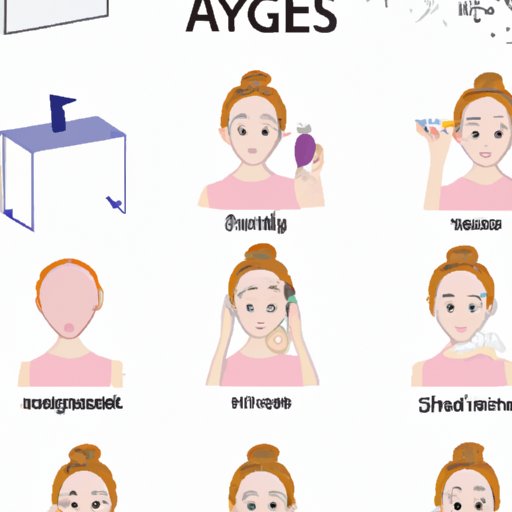Introduction
Hormonal acne is a common skin condition that affects both men and women. It is caused by an imbalance of hormones in the body, which causes increased oil production and inflammation. Hormonal acne is often characterized by cysts or nodules on the chin, jawline, and cheeks. While it can be difficult to treat, there are some steps you can take to help prevent it.
Eating a Balanced Diet
Eating a balanced diet is one of the best ways to prevent hormonal acne. Eating a variety of healthy foods, including fruits, vegetables, whole grains, lean proteins, and healthy fats, can help keep your hormones in balance. Eating a balanced diet can also help reduce inflammation in the body, which can help reduce the severity of your acne.
Some foods have been shown to have anti-inflammatory properties, such as salmon, walnuts, chia seeds, almonds, and leafy greens. Additionally, probiotic-rich foods like yogurt, kefir, and kimchi can help balance the bacteria in your gut, which can help reduce inflammation.
Get Plenty of Exercise
Exercise can help keep your hormones in balance, as well as reduce stress levels, which can help prevent hormonal acne. Exercise also helps increase circulation, which can help keep your skin clear. Aim to get at least 30 minutes of moderate to vigorous exercise per day.
Some types of exercise that can help improve hormonal balance include aerobic exercise, resistance training, and yoga. Aerobic exercise helps to reduce stress hormones and can help keep your hormones in balance. Resistance training helps to strengthen muscles and can help improve your metabolism. Yoga is a great way to reduce stress and can help improve your overall wellbeing.
Avoid Dairy Products
Dairy products have been linked to an increase in hormones, which can trigger or worsen hormonal acne. Dairy contains hormones and growth factors that can stimulate oil production and cause inflammation. Avoiding dairy products can help reduce the severity of your acne.
If you are looking for alternatives to dairy, you can try plant-based milks, such as almond milk, coconut milk, oat milk, and soy milk. These milks are usually fortified with calcium and other nutrients, so they can provide similar nutrition as cow’s milk.
Use Gentle Skin Care Products
Using gentle skin care products can help prevent hormonal acne. Harsh, abrasive cleansers can strip your skin of its natural oils, which can lead to an increase in oil production and inflammation. Instead, opt for gentle, non-comedogenic cleansers that won’t clog your pores.
Look for skin care products that contain natural ingredients such as aloe vera, tea tree oil, and witch hazel. These ingredients can help soothe inflammation and reduce oil production. Additionally, look for products that are free from harsh chemicals and fragrances, as these can irritate your skin.
Limit Sugar Intake
Sugar can lead to an increase in insulin, which can cause an increase in oil production and inflammation. Limiting your sugar intake can help reduce the severity of your hormonal acne. Try to avoid processed foods, such as candy, cakes, and cookies, which are typically high in sugar.
Instead, opt for healthier sources of carbohydrates, such as whole grains, fruits, and vegetables. These foods are rich in fiber and other nutrients, which can help keep your hormones in balance. Additionally, reducing your sugar intake can help keep your blood sugar levels stable, which can help reduce inflammation.
Manage Stress Levels
Stress can lead to an increase in hormones, which can trigger or worsen hormonal acne. Learning to manage your stress levels can help reduce the severity of your acne. Some techniques to help manage stress include deep breathing, meditation, yoga, journaling, and talking to a therapist.
Additionally, getting enough sleep can help reduce stress levels. Aim to get 7-9 hours of quality sleep each night. This can help reduce stress hormones and keep your hormones in balance. Finally, engaging in activities that you enjoy, such as reading, listening to music, or spending time with friends and family, can help reduce stress levels.

Wash Your Face Twice Daily
Washing your face twice daily can help remove excess oil and dirt from your skin, which can help reduce the severity of your acne. Use a gentle cleanser that is free from harsh chemicals and fragrances. Additionally, use lukewarm water and don’t scrub your skin too hard, as this can irritate your skin.
After washing your face, apply a moisturizer to help keep your skin hydrated. Look for moisturizers that contain natural ingredients, such as aloe vera and jojoba oil, as these can help soothe inflammation and reduce oil production. Additionally, using a mild exfoliator once or twice a week can help remove dead skin cells and keep your skin clear.
Conclusion
Hormonal acne can be frustrating to manage. However, there are some steps you can take to help prevent it. Eating a balanced diet, getting plenty of exercise, avoiding dairy products, using gentle skin care products, limiting sugar intake, managing stress levels, and washing your face twice daily can all help reduce the severity of your hormonal acne.
If you continue to struggle with hormonal acne, it is important to seek professional help. A dermatologist can recommend treatments and medications to help control your acne. With the right treatment and lifestyle changes, you can find relief from hormonal acne.


